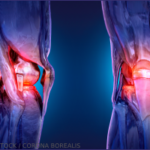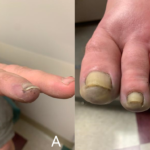Difficult-to-treat rheumatoid arthritis (RA) is defined as the failure of two or more classes of biologic or targeted synthetic disease-modifying anti-rheumatic drugs (DMARDs) to control active or progressive disease in patients with RA. Between 5 and 20% of patients with RA have difficult-to-treat RA.
Search results for: Obesity

Crucial to Rheumatic Care: Insights into the Importance of Trust
Gaining trust has a significant effect on disease management and patient care, according to experts at ACR Convergence 2023. Here are insights into the barriers to that trust and how healthcare providers can develop trusting relationships with their patients.

3 AC&R Study Summaries: Prescribing Patterns, PMR & Glucocorticoids, & Infection Screening
A Shift in Prescribing Patterns Safety issues prompt discontinuation of tofacitinib By Stephanie Song, MD, & Joshua F. Baker, MD, MSCE Why was this study done? The ORAL Surveillance study highlighted risks of cardiac events, thromboembolism (VTE) and malignancy associated with use of Janus kinase inhibitors (JAKi). We sought to determine the impact of safety…

What Every Clinician Should Know about Ramadan & Intermittent Fasting
Intermittent fasting—defined as alternating between cycles of eating and going without food over a given period of time—has become popular with individuals seeking to lose weight or balance their lifestyle in recent years. During Ramadan (a period based on the Gregorian calendar that changes from year to year), able-bodied Muslims are obligated to observe a…

Study: Most Patients with PMR Aren’t Getting Steroid-Sparing Agents in First 2 Years
A minority of patients with polymyalgia rheumatica (PMR) who were new to rheumatology practice were prescribed steroid-sparing agents through two years of follow-up. This is according to a large, U.S.-based cohort study, published in Arthritis Care & Research, which also found that nearly two-thirds of the patients remained on glucocorticoids beyond one year.1 “Our study…

Gout & Its Comorbidities
At ACR Convergence 2023, experts addressed important topics in gout research, including treating and preventing gout flares, lowering urate levels and managing comorbidities, as well as racial inequities in gout treatment, disease burden and outcomes.

The Heterogeneity of Psoriatic Arthritis
SAN DIEGO—Differences between psoriatic arthritis and rheumatoid arthritis highlight the need for the development of imaging modalities, laboratory tests and other biomarkers that are explored and validated specifically for PsA to advance the goal of personalized or precision medicine. In this article, expert David S. Pisetsky, MD, PhD, explores the top research in psoriatic arthritis presented at ACR Convergence 2023.

When Is Arthroplasty Recommended? New ACR/AAHKS Guideline Offers Considerations for Timing of Elective Hip or Knee Arthroplasty
The ACR released a new arthroplasty guideline in an effort to remedy significant & detrimental delays faced by osteoarthritis or osteonecrosis patients who require surgical intervention.

Ethics Forum: Mitigation Tips for Health Disparities Among Rural & Indigenous Peoples
A common case scenario in our practice in North Dakota is a woman with rheumatoid arthritis on methotrexate monotherapy. She is a member of the Sisseton Wahpeton Oyate people and lives 90 miles from our rheumatology clinic. She currently has moderate disease activity, indicating the need for additional treatment. She does not have her own…

Case Report: A Patient Presents with Digital Ischemia & Gangrene
Defined by the presence of antiphospholipid antibodies (aPL) in individuals with clinical evidence of thrombosis or pregnancy morbidity, antiphospholipid syndrome (APS) is a systemic autoimmune thrombophilia. Clinical thrombosis, which should be confirmed by objective validated criteria (e.g., imaging studies or histopathology), can occur in the arterial, venous or small vessel vasculature and is not limited…
- « Previous Page
- 1
- 2
- 3
- 4
- 5
- …
- 25
- Next Page »